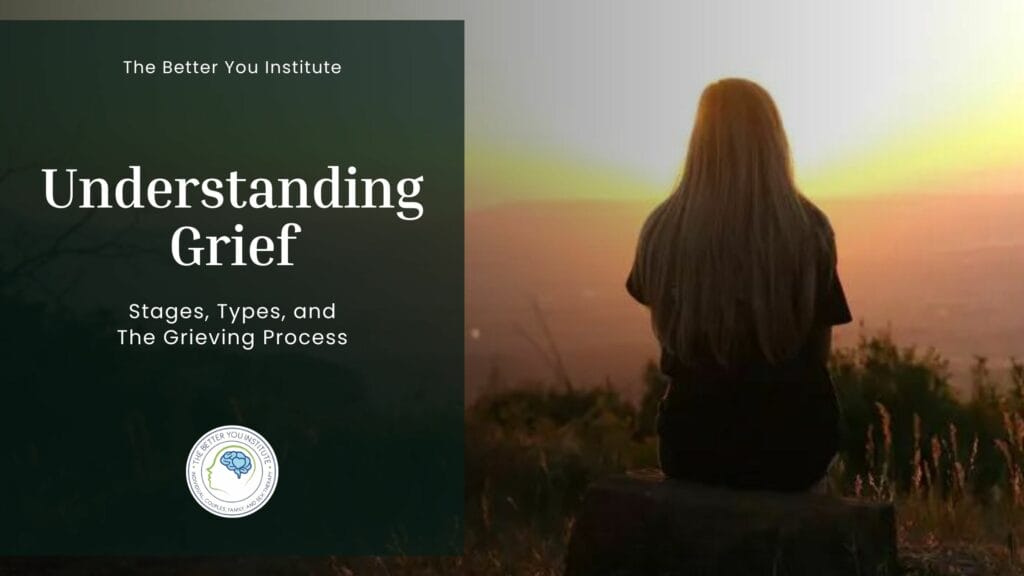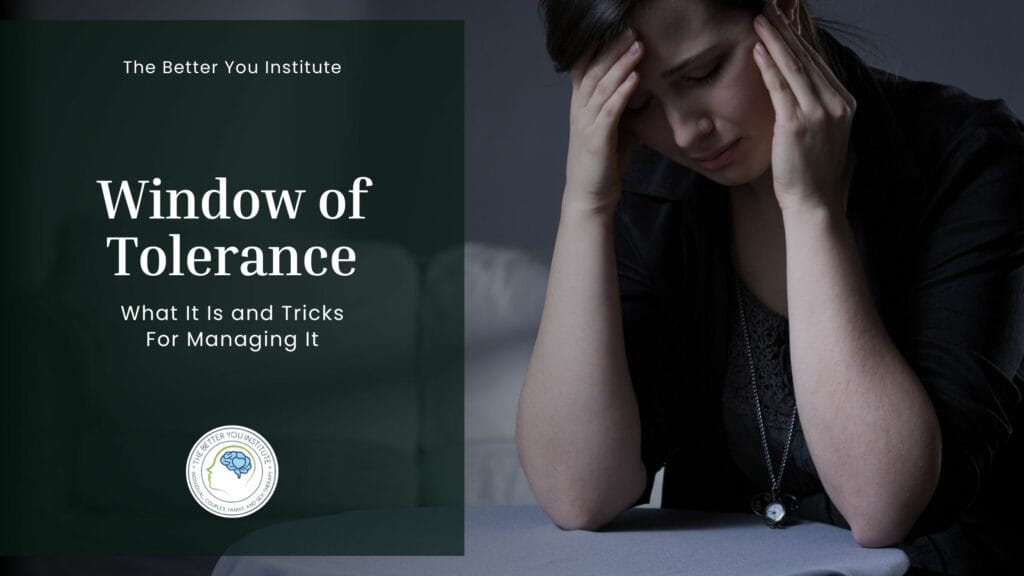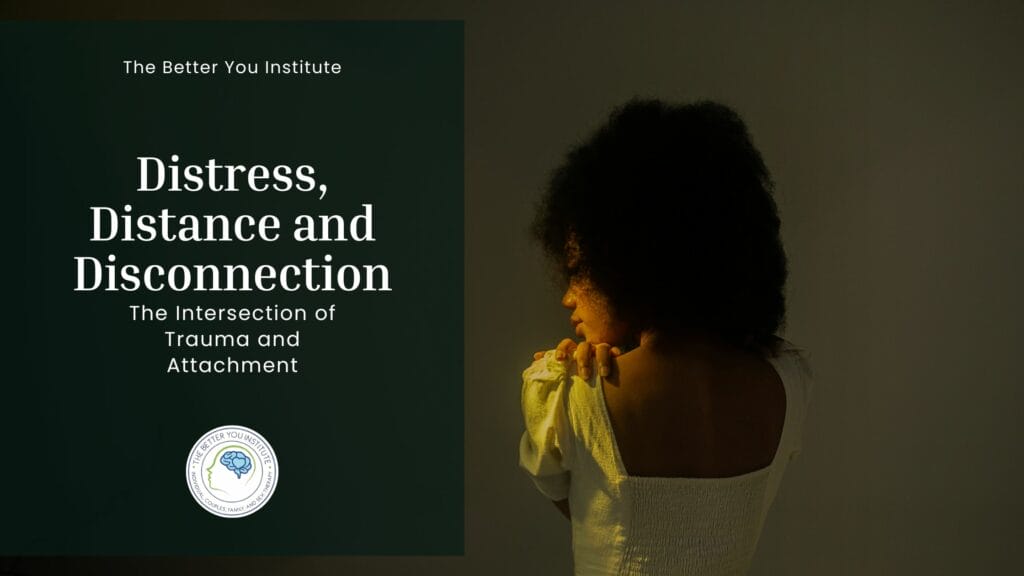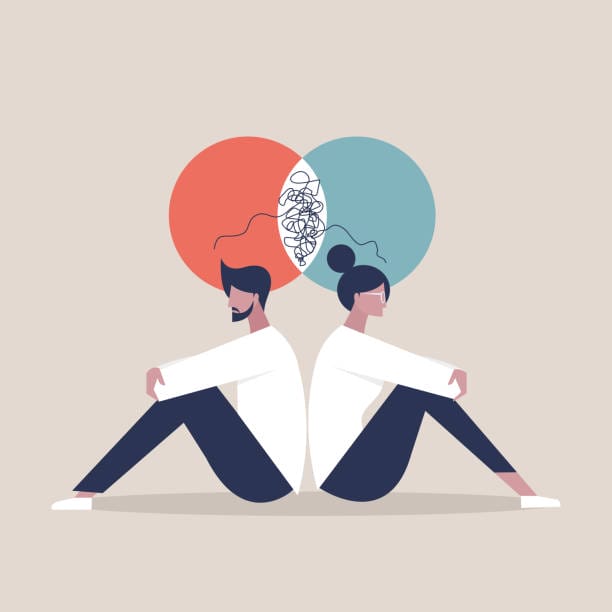This article is for anyone who wants to better understand what grief is, how grief affects us, and how to sit with and carry our grief a bit easier.
Table of Contents
Understanding Grief and Loss:
Grief is best known as an emotional, sorrowful, response to a loss, particularly the death of a loved one. Grief will impact us to our core and bring up a lot of intense emotions. Everyone experiences grief in one form or another, but this does not mean that how we grieve will look or feel the same. Many people are familiar with Elisabeth Kübler-Ross’ 5 Stages of Grief that are denial, anger, bargaining, depression, and acceptance.
While many people find the five stages of grief to be very helpful, it’s so important to understand that grief has no timeline and there is no “right” way to grieve. You are in control of how you grieve and what you need along the way.
Understanding the Types of Grief:
Common Grief
Most of us are familiar with common grief relating to the emotions and sorrow following the death of a loved one. Loss of a relationship, like a breakup or a job loss, can also be common grief.
These factors can all inflict some type of grief response as we are essentially mourning something we loved or enjoyed.
Anticipatory Grief
Anticipatory grief is the apprehension of an upcoming or future loss that may cause distress.
An example of this is someone you know dying of a terminal illness or your parents aging and getting closer to death.
Another example of this is when the economy is bad and you assume you will lose your job because of it. While we can see that our parents are healthy or okay now, the fear and dread of someday losing them can greatly affect our emotional state.
Similarly, the uncertainty of the economy raising concern for your job stability can feel unbearable. We can also experience anticipatory grief for other losses like big life transitions, such as moving away to college, preparing for a career change, beginning a marriage, preparing to raise children, and more.
These different transitions bring some type of loss for our past self or stage of life, and anticipation for this new change.
Complicated Grief
Complicated grief is described as ongoing and intense grief that may be stopping you from healing. It’s also described as lingering or worsening grief symptoms following the experience of common grief, usually lasting a long time.
An example of this is someone who continues to mourn and be depressed months after a loss to the point where it affects most factors of life.
Another example of this may be due to the experience causing the grief continuing to happen, such as an on-again off-again relationship where you have to keep grieving the loss of the relationship.
Disenfranchised Grief
This grief relates to more taboo topics that society may deem as less important or less valid but we are still left with emotions of grief.
An example of this could be losing a pet (which really really sucks and hurts). For some people, this is as big of a loss as losing a person and people may need the space and time to heal and grieve.
However, society tends not to view pet loss on the same level as a human loss and certain people may expect you to heal faster. For instance, your job may give you bereavement time for the loss of a close relative or partner, however, they do not provide the same time off for the loss of a pet. This experience can be so cruel and dismissive to the griever and their feelings, and make them feel that the loss they experienced is invalid and does not matter.
Another form of disenfranchised grief is when a person grieves something that they are also happy about. For example, feeling ecstatic that your partner is getting to embrace the real them through a transition but you are grieving the loss of the person they once presented as. The life you led with them as one gender will be gone and a new life will start. Society may see your grief as being less accepting of your partner’s transition, which is not the case.
Instead, there is a duality to your emotions: happiness/joy and grief/loss.
Delayed Grief
Delayed grief is almost like putting a mask over your experience and not allowing the pain or grief to show up until long after the death or loss. People may suppress or extremely minimize their emotions during this type of grief. Or the bottled-up emotions can begin to show up in other ways such as misdirected anger or depression.
The griever may avoid or never bring up the person who died to continue to delay or not acknowledge the loss and grieving process.
Another presentation of delayed grief is a person may bury themselves in their job when they don’t get the promotion they wanted and become upset with their partner when asked for more time together and less time at work.
Cumulative Grief
Cumulative grief is when someone experiences another loss leading to grief while still dealing with or processing the first grief. For example, someone is still processing the death of a loved one when another loved one dies. Thus, adding more grief. There are a few sayings, “bad things come in threes” or “when it rains, it pours,” which fit nicely with cumulative grief.
Cumulative grief can often feel overwhelming. A person may really suffer in a variety of different areas in their life due to not being able to get a hold of life in their grief.
A prime example of this might be someone who has an hourly job where no bereavement time is offered and they are the breadwinner of their family. They lost their partner unexpectedly. Their partner was the stay-at-home parent of two children under 10 years old. This person has to grieve the loss of their partner, the lifestyle they used to have, and try to figure out childcare and day-to-day routines of their children.
In their grief, they become overwhelmed and start to take days off. They use up their vacation time so now they’re taking unpaid leave. The bills start to add up and the electricity gets turned off. You see where this story is going. Cumulative grief can drown a person if they do not have the proper support.
Collective Grief
Collective grief is grief felt by an entire group (community, village, entire nation). Many people are experiencing collective grief right now in the face of the COVID19 pandemic and all the deaths and uncertainties we’ve felt.
Other collective grief examples are towns grieving a student’s or respected member’s death, the nation’s grief after the 9/11 attack, and other catastrophic, traumatic, and emotional experiences impacting large groups.
The type of griever you are:
While everyone does grieve differently, over time there have come to be 3 different griever types that people tend to fall into. Knowing these styles may help someone feel more understood and validated in their process. Just remember, your grief is YOUR grief, not what someone tells you it is or the category or type of griever you are or should be.
Learn more about what type of griever your are.
Intuitive Grief
This style of grief is focused more on the outward or emotional expression of sadness or grief rather than holding in feelings. This can look like crying, anger, depression, and more.
An intuitive griever tends to speak more of their loss and reach out to loved ones to be consoled. It’s been said that more women will fall into this category as women tend to be more emotional and expressive in their feelings than men, so this is labeled as more “feminine”.
Instrumental Grief
This style of grief is described as using more of a problem-solving approach rather than focusing on feelings. Instrumental grievers may focus more on their jobs, or tasks to complete, or different distractions. They like to keep busy and may not be as expressive in their emotions. This style tends to be labeled as more “masculine.”
Blended Grief
Blended Grief highlights that people can fall into either category of griever and display both inward emotional processing and outward expression of emotions. In removing gender or societal norming stereotypes and categories, blended grief is the biggest supporter of individualized grieving.
Ways grief can affect us and how to cope:
Emotional Responses
Grief will hit us right in our hearts and feel unrepairable. With grief and loss come common emotional responses such as:
- Sadness
- Crying spells
- Low motivation
- Anxiety
- Anger
- Guilt
- Shame
- Perfectionism
- Hopelessness
- Helplessness
- Emptiness
- Unsettled
- Unfinished
- Lacking closure
- Longing
- Inconsolable
- Jealous
- Lost
- Relief
- Solace
- Connection to others
- Disconnect
- Misunderstood
- Pride
- Cheated
- Numb
These emotions are natural responses to something so difficult for a human to navigate. It’s important to be mindful of your emotions and the emotions you may not be allowing yourself to experience. Not processing our emotions generally ends in an eruption that does not help us and can cause more damage.
It can also be hard to know what emotion is coming up in early grief, so try to be gentle with yourself and know whatever the emotion is, it is valid because you are mourning and trying to make sense of the incomprehensible. Some helpful tips for navigating the emotional effects of grief include –
- Journaling your thoughts and feelings
- Talking to your family or friends that can support you
- Allowing room to cry, yell, laugh, smile, whatever is coming up for you
- Meeting with a therapist or a trained grief therapist
- Meditation or mindfulness work
- Using or creating helpful mantras to support your emotions. For example “It’s okay to cry right now, I am sad and that is valid.” Or “This really hurts AND I can still practice/be/remind myself _____ (insert task or affirmation here).”
- Labeling your emotions/experience
- Work toward understanding your thoughts/behaviors/emotions
- Lean in with compassion, kindness, and empathy toward yourself
- Accept help when it’s offered to you
- Sit in your feelings: label them, where do you feel them in your body, do they have a temperature, do they have a color, is it moving around, is it telling you something?
- Give yourself permission to act out your emotions: yell into a pillow, focus on the details of the funeral, research, talk, etc.
- Take the lead in planning the bereavement services.
- Start an organization or join one that is related to the cause of something that greatly impacted you (e.g., a social justice organization, Toast Masters, soup kitchens, etc.).
- Have a ceremony that would honor the loss (e.g., go through old memorabilia, throw out all your ex’s stuff, host a memorial for your pet).
Physical Responses
- Stomach pain/GI issues
- Tightness or tension in the body
- Decrease/increase in sleep
- Increase/Decrease of appetite
- Increased anxiety affecting heart rate and breathing
- Fatigue
- Suppressed immune system
- Wound tight/inability to feel calm
- Dissociating (not feelings present or feeling like you are outside of yourself)
Our bodies can hold our emotions, sometimes so heavily that it literally weighs us down. The physical symptoms of grief can last a while so it can be helpful to follow these support steps or come up with your own physical releases when needed.
- Recognize where you are feeling the grief in your body. Try to label, shrink or expand it, move it around your body, etc.
- Practice relaxation exercises. Progressive Muscle Relaxation (sometimes called PMR) can be good for decreasing anxiety or releasing physical tension
- Hug yourself or hug one of your support people
- Use a stress ball to squeeze or throw
- Use movement – exercise, stretching, dancing, yoga, kickboxing, etc
- Punch pillows
- Drink water to stay hydrated because crying can dehydrate
- Monitor sleep and appetite patterns and create a support plan to help find a good balance
- Stay structured in your day, try to get back to the daily schedule you had prior to the loss
Cognitive Responses
Our thoughts and perceptions may be affected by grief and this could sound like:
- Fixation on the loss (rumination)
- Racing thoughts
- Slowed thoughts
- The disbelief of the loss
- Poor focus or concentration
- Memory loss
- Negative worldviews after the loss. For example – “What’s the point of anything now? Everyone will leave me and nothing will get better.”
- Entitlement
- Negative self talk
- Suicidality
- Daydreaming
Just as our emotions and body may have trouble making sense of a loss, so will our brain. We may experience different triggers or thoughts that can cause us to dissociate, lose focus, or experience other symptoms from the above list. Try some of these support steps to help with cognitive responses.
- Try practicing a grounding technique that can help us feel present if we feel out of the body, or detached.
- Journaling thoughts to help make more sense of them
- Try to challenge negative or irrational thoughts
- Create organizational structures to help with focus and memory loss (use a calendar, set alarms, set reminders on your phone, or sticky notes)
- Validate where you are: Remind yourself that you experienced a loss that comes with intense and sometimes incomprehensible pain and you may not always be in the right frame of mind and that is okay
- Show yourself compassion, Compassionate Self-Talk, and kindness
- Give grace to yourself when things don’t go how you’d like them to
Relationship/Interpersonal Responses
Grief has a wide range of how it impacts how we engage in relationships. The most common relational impact from grief is not seeing family or friends. Family and friends can become reminders of the lost loved one.
You may find yourself avoiding dating because you are still grieving a breakup. Or avoiding seeing friends who have pets because yours just died or needed to be put down. Some of us engage in unhealthy relationships to find support or possible detachment from the loss and ourselves.
Some people seek extra support and may be more attached in relationships so they don’t lose another person close to them. It’s important to stay mindful of your intentions with relationships during this grieving period and who is a healthy support for you. Some suggestions in this area are
- Setting boundaries. For yourself and with others. This can look like sticking to your own self-care time and saying no to others when you need your own rest or space. It’s also important to say no to others when they are not helping your healing process and/or tell your support team how they can help you (you know you best!)
- Attend grief support groups to be around others that can validate and may better understand your grief
- Ask for constructive feedback from those you love and trust
- Invite people to grieve with you (create a ceremony with them that helps you mourn: funeral or burning pictures of your ex)
Spiritual Responses
Our spirituality may be tested in the face of death, loss, and grief. This can look like
- Questioning and/or feeling anger, hurt, guilt, etc towards our religion or higher power for causing suffering
- Feeling conflicted about grieving the way we want to versus how our religion or spiritual community tells us to grieve
- Wanting to believe that there is a reason for this pain but still having the pain and being in tension with yourself
- Searching for answers
Some ways to navigate this are
- Speak with a spiritual leader or group for more support
- Participate in rituals that help heal (e.g., praying, ceremonial dancing, confessing, meditate)
- Read the book of your religion
Responses guided by grief
Grief is a burdensome beast that if not handled with care can get the best of you. If you ignore your grief or hope that it will go away, you may start to let those negative emotions, cognitive responses, and physical issues take over. Indeed, you may find yourself reaching for that extra bottle of wine or heroin to numb the emotional pain.
You may find yourself becoming addicted to painkillers or sleep aids. You might cut yourself just to feel something because you’ve felt numb for so long. Or quite the opposite, you may cut so you can feel a different pain than the pain of grief you’ve been feeling.
Your anger might get the best of you and you lash out at work and throw a punch. While it may not be easy to use the tools discussed above (and below), processing your grief is imperative to begin to heal from the loss you’ve experienced. The loss is something you went through but the grief from it doesn’t have to become a part of who you are.
By using these tools, you will be in the driver’s seat, not your grief.
Other tools or ways to cope with your loss and begin to heal through grief work:
- Writing a letter to your loved one
- Create a memory box about your loved one or with items from that person (or pet)
- Attend therapy and/or grief support groups.
- Find literature about death, grief, and healing that resonates or connects with you
- DO NOT minimize or invalidate your feelings and do not allow others to do this to you
Helpful resources for understanding grief:
- “It’s OK that you’re not OK” – Book by Megan Devine, therapist and writer, who experienced her own grief through tragically losing her partner
- https://refugeingrief.com/ – Megan Devine’s grief support website
- https://www.centerforloss.com/ – Dr. Alan Wolfet, Founder and Director of the Center for Loss and Life Transition
- https://www.griefshare.org/ – grief support groups
- https://grief.com/ – David Kessler’s website on grieving
- “The secret language of your body” – Book by Inna Siegel
- Terrible, thanks for asking – podcast
Remember, grief is a natural human response that tells us we loved someone or something very much. Grief hurts tremendously but we can create room to begin to heal. You don’t have to sit in your grief alone. If you have more questions or want to begin exploring or coping with your grief, please reach out to one of our trained therapists in Philadelphia, PA at The Better You Institute. You can call us at (267) 495-4951 at any time for a free consultation and begin your healing journey with grief counseling in Philadelphia.
Meet The Author:

Caitlin Siekerka
Licensed Professional Counselor
Caitlin Siekerka, LPC, a Licensed Professional Counselor in Pennsylvania and New Jersey, is dedicated to guiding individuals on their path to finding meaning and purpose. She uses a compassionate, empathetic approach in therapy, helping clients achieve balance and develop coping skills. Specializing in depression, anxiety, self-esteem issues, bipolar disorder, grief, trauma, life transitions, and substance use, Caitlin offers personalized therapy using techniques like CBT, DBT, and mindfulness. An LGBTQ+ ally, she creates a safe space for growth and exploration in Philadelphia. Caitlin holds a master’s in Counseling Psychology from Rosemont College, continually educating herself to provide the best support.
Learn more about Caitlin Siekerka ⇒







